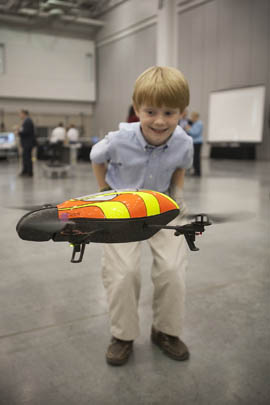Cronkite News has moved to a new home at cronkitenews.azpbs.org. Use this site to search archives from 2011 to May 2015. You can search the new site for current stories.
Lawmakers seek curbs on police power to use drone aircraft
PHOENIX – Rapidly advancing drone technology packing the latest surveillance tools into affordable and lightweight machines could help police do their jobs more effectively and with greater safety.
But some Arizona lawmakers say that current state law doesn’t offer enough privacy protections against police using drones.
“Many of my constituents out there that approached me really believe that if law enforcement is using drones and cameras, spying on people or looking at what’s going on, they really need to have a search warrant, they need to have a good reason,” said state Rep. Jeff Dial, R-Chandler.
Dial introduced a bill, HB 2574, that would require a warrant for police to use drones to collect evidence against people except in emergencies.
Dial’s bill wasn’t taken up in committee, but a similar bill by Rep. Tom Forese, R-Chandler, made it through the House Commerce Committee on Feb. 20. HB 2269 also calls for police to get a warrant but would lower the standard for the use of drones from probable cause to reasonable suspicion.
Forese said he is working with the Arizona Commerce Authority to bring more military-grade drone business to the state. He authored a resolution, which the House has approved and forwarded to the Senate, that would express the Legislature’s support for the Federal Aviation Administration to place one of several national drone test ranges in Arizona.
Forese said that economics should play a role in any policy decisions on drones.
“I do not think that these issues are mutually exclusive,” Forese said. “I believe that we can strike a balance between privacy and economic development and that will be our objective.”
The drones making most of the headlines lately are larger fixed-wing machines used by the U.S. to track and kill enemies in other countries. Drones used by police are much smaller – up to 25 pounds – and look more like remote-controlled helicopters. They almost always carry cameras but can also be equipped with facial recognition technology, tools that can lock onto and track cellphone information and cameras that can see through walls.
Arizona is among more than two dozen states considering legislation to regulate how police use drones, and legislation is pending in Congress.
“State lawmakers of both parties have realized this issue is critical in voters’ minds, and they’ve decided to take a stand for privacy,” said Trevor Timm, an activist with the Electronic Frontier Foundation focusing on surveillance issues. “In all my work at EFF, I’ve never seen anything that so unites the left and right. I think it underscores that this is a nonpartisan issue that has struck a chord with people.”
Most of the legislation would require police to get a warrant before using drones to collect evidence against people. In some states, the bills call for a moratorium on drone use. Charlottesville, Va., passed a resolution this year banning any use of drones by the city.
A 2012 Federal Aviation Administration policy allows public safety agencies to operate drones up to 5 pounds under certain circumstances. The policy has since expanded to allow devices weighing up to 25 pounds.
But Lt. Col. Thomas Streed, a retired law enforcement officer from California who’s been watching the drone debates at the Arizona Legislature, said Forese’s bill doesn’t include enough protections for everyday people.
“I’ve worked in communist countries, and I have to tell you that unbridled surveillance is a way of life for those people and no one should have to live like that,” he said. “This is a step toward that, independent of the reasonable and appropriate regulations that control such conduct.”
Mario Mairena, government relations manager for a drone-industry trade group called the Association of Unmanned Vehicle Systems International, said a lot of the bills in legislatures across the country are fueled by misperceptions.
“When the average citizen thinks about drones, they think about the (unmanned aerial systems) that are being utilized in theater,” he said, referring to machines used in Iraq, Afghanistan and other countries. “That’s not what we’re talking about here.”
Current constitutional protections are enough to regulate the way police use drones, he said.
“The Fourth Amendment to the U.S. Constitution has protected individuals from unreasonable searches and seizures for years,” Mairena said. “We feel there’s no reason to think that the courts aren’t able to handle this new technology.”
Mairena said his trade group’s code of conduct calls on drone operators to respect privacy regardless of the technology. He also pointed to guidelines adopted by the International Association of Chiefs of Police that call for police to operate drones within constitutional limits.
Mairena said that drones are no different than helicopters the police already use to surveil people. But Timm, the activist from the Electronic Frontier Foundation, countered that helicopters are expensive and typically only used for serious investigations.
“Drones are so cheap,” he said. “There’s a big difference, and the chance that police would use them for more routine, everyday surveillance.”
Dial said drones could be very helpful with things like search and rescue and scientific research, but he said the ability for police to use them has to be regulated.
“We don’t want to feel like we’re living in a police state,” he said.







